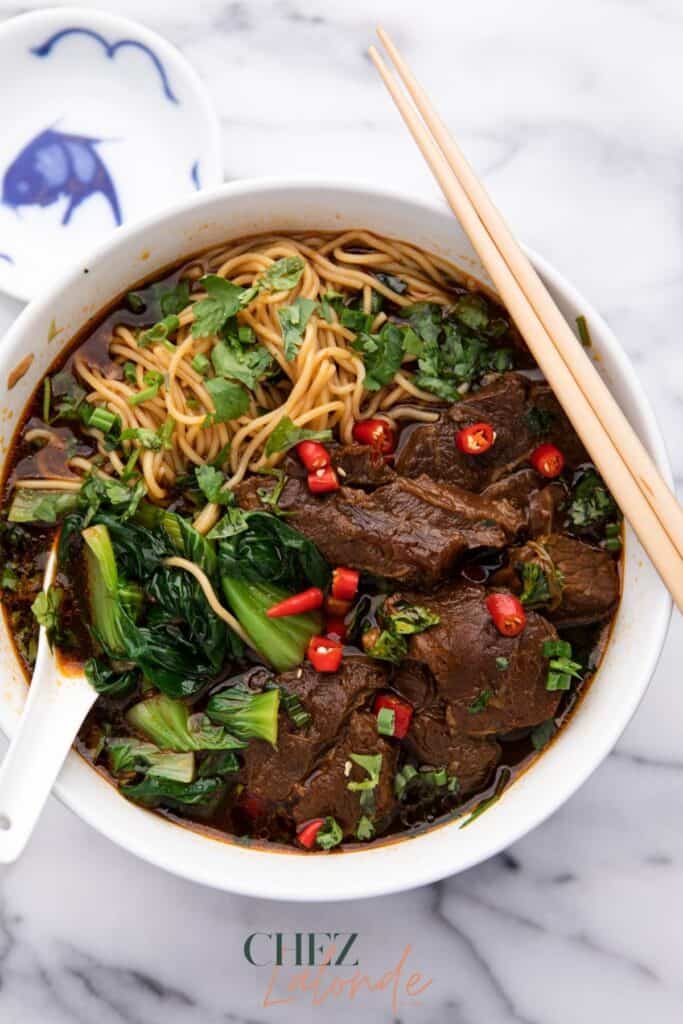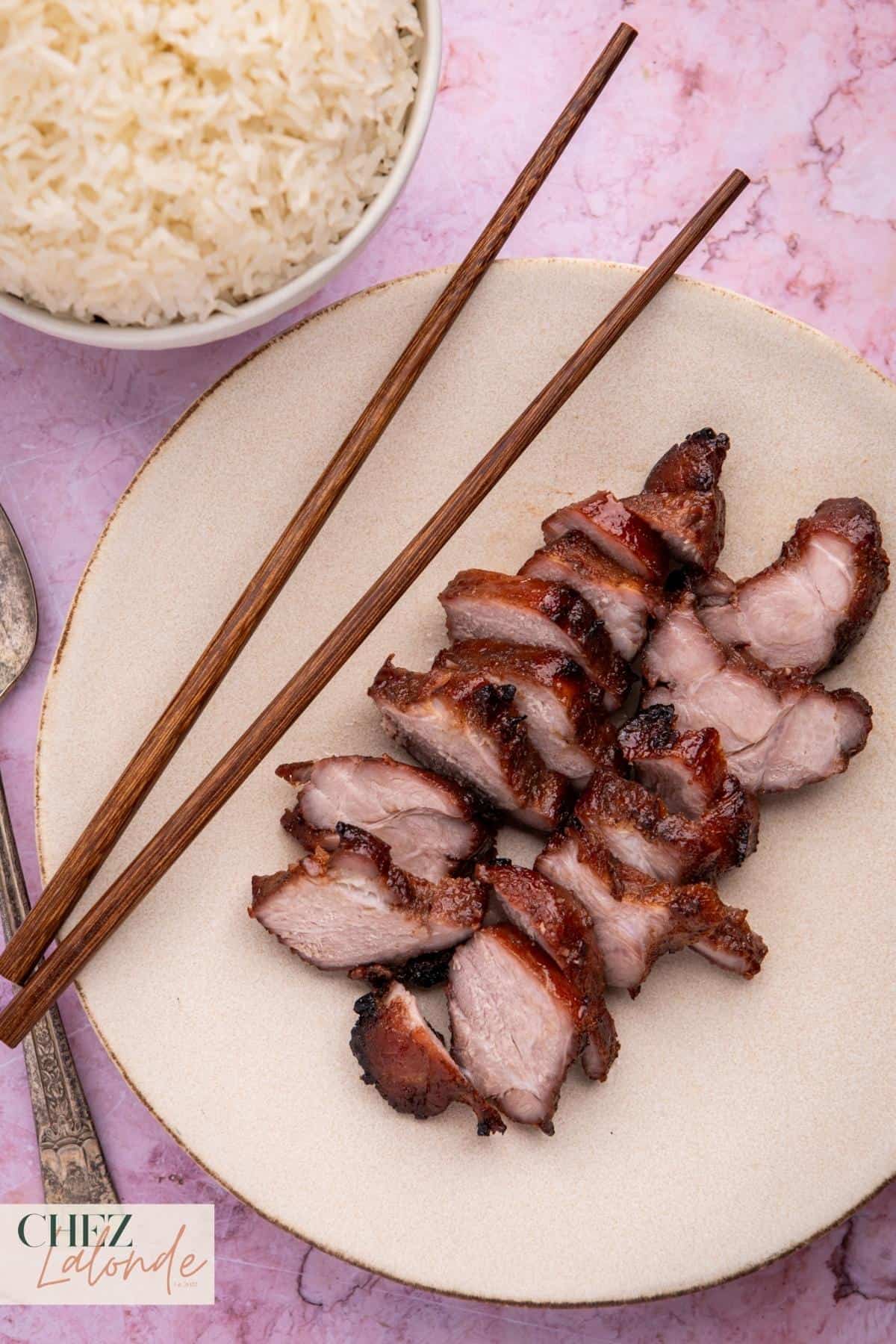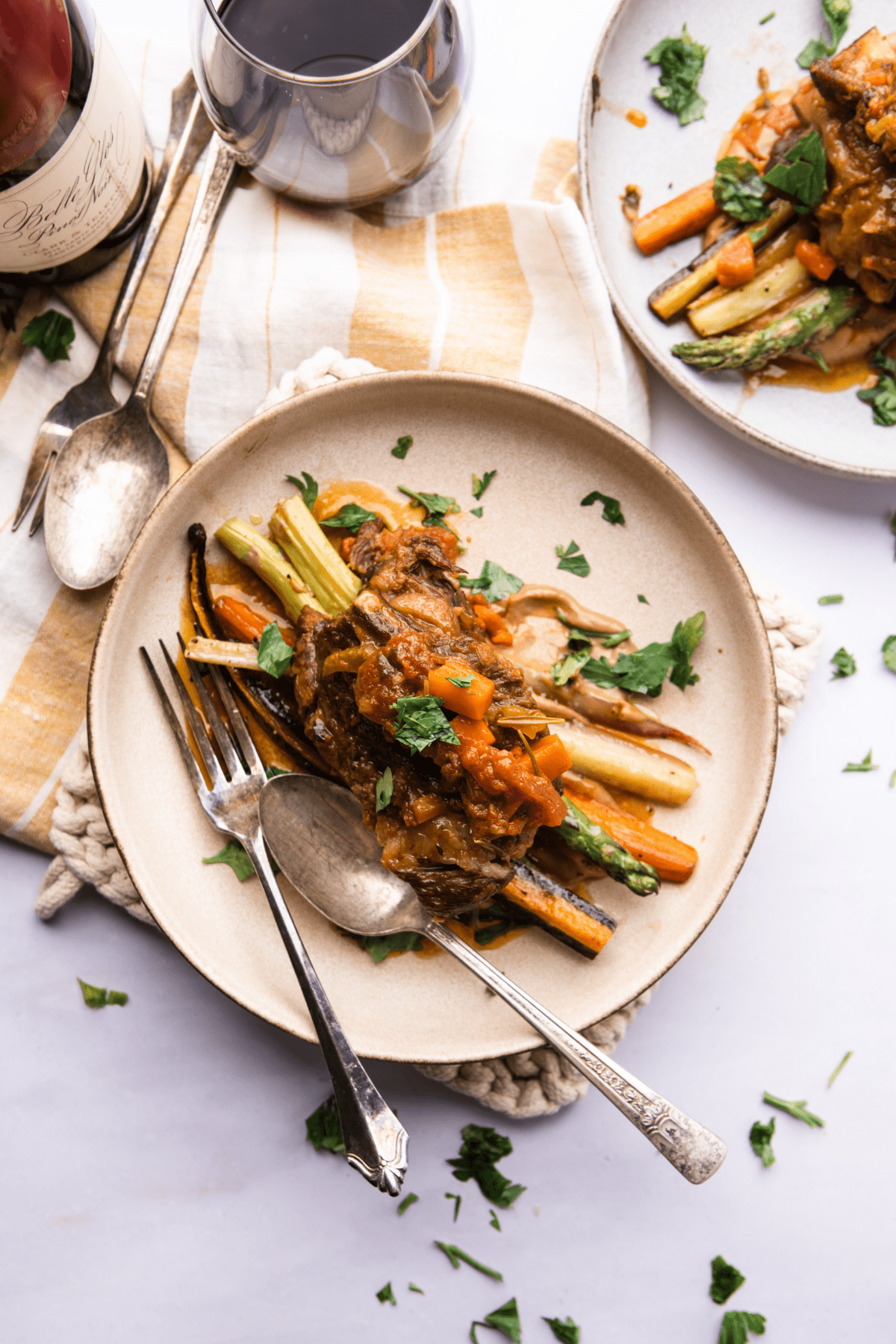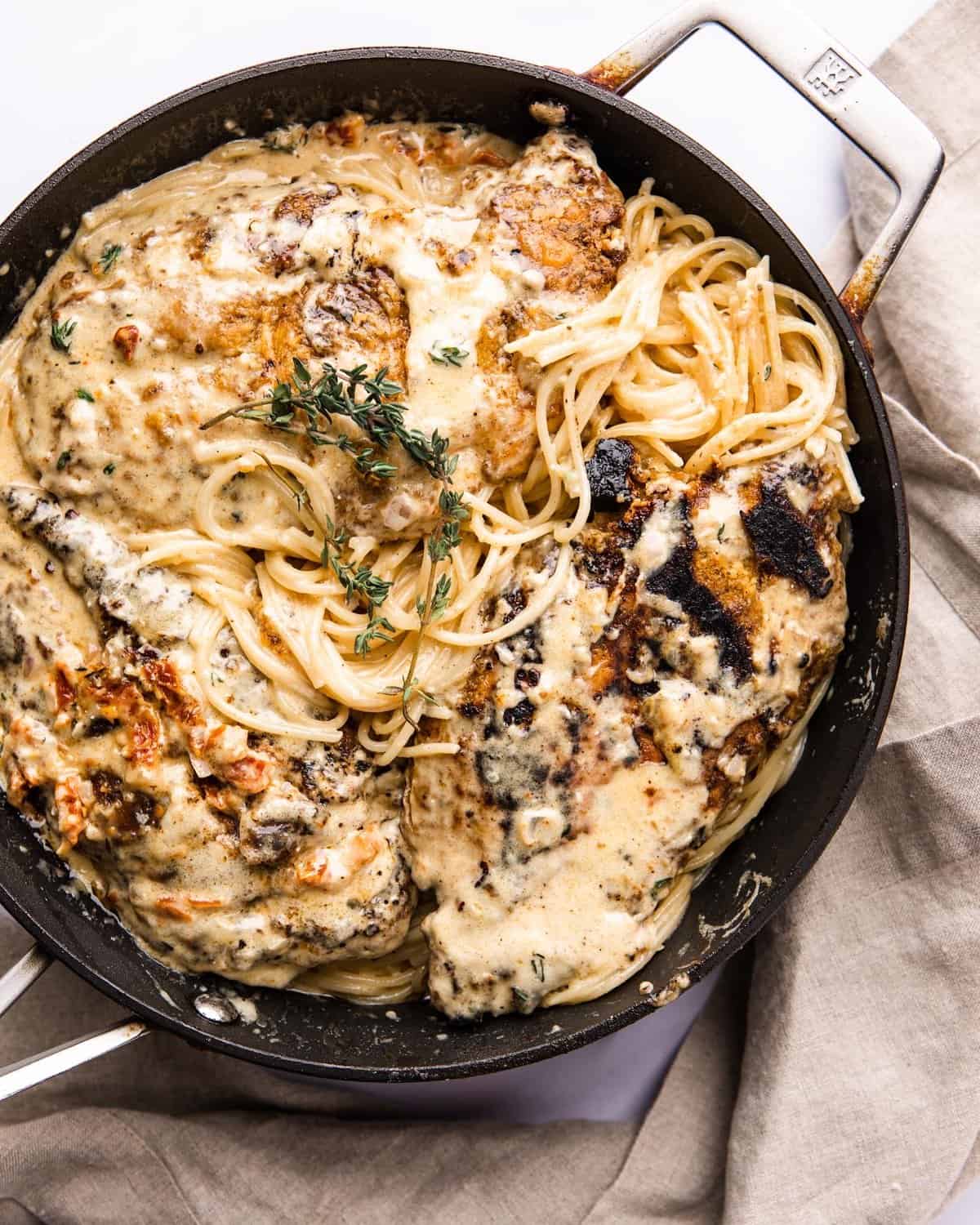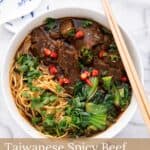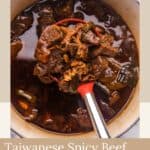Taiwanese Spicy Beef Noodle Soup: A Step-by-step Guide
What if I tell you you do not need to take an 18-hour flight to Taiwan or Google “Where is the closest Taiwanese food near you” in order to have some authentic and delightful Taiwanese spicy beef noodle soup right at home?
You read it right; I am showing you how to make this fantastic and hearty beef noodle soup in today’s post.
Let’s learn how to make this delicious and authentic Taiwanese noodle soup recipe at home with my easy-to-follow step-by-step guide. Discover what ingredients, spices, and techniques I use to create this iconic dish.
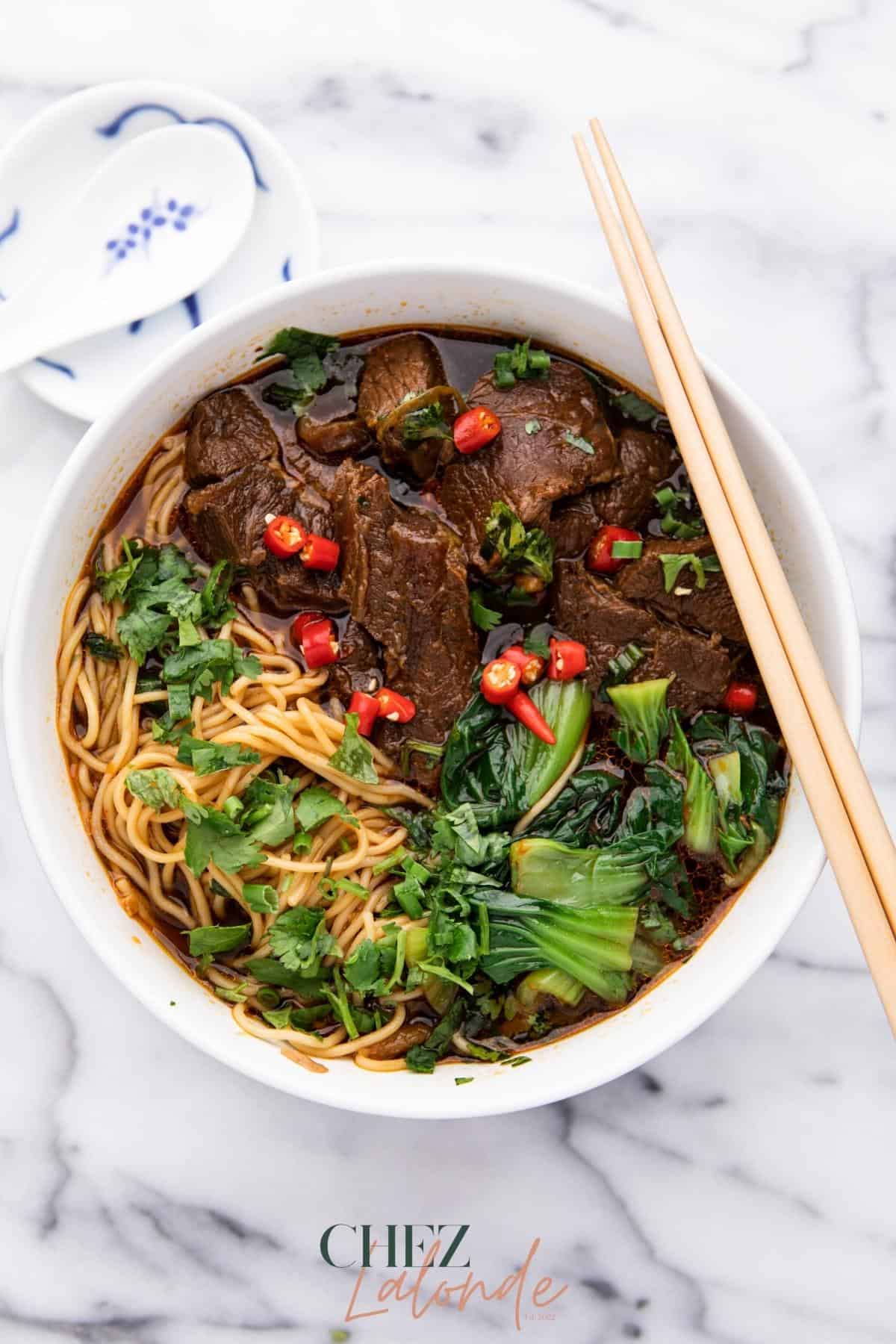
Disclaimer Notice: This website contains affiliate links. If you make a purchase through these links, I may earn a commission at no extra cost to you. I only endorse products or services I believe will be valuable to my readers. I appreciate your support.
This beefy, flavorful soup is known for its tender beef shank with a distinctive five-spice aroma that would make you want a second bowl before you finish the first one. I have had this noodle soup numerous times at local Taiwanese restaurants. But you know me, I always want to make restaurant-style food at home. So, I have tried to perfect this recipe for years and finally did it. Today, I will show you step-by-step instructions on how to prepare this fantastic dish.
Recipe Snapshot
EASE: Pretty easy to make. You need patience.
PROS: It is the best Asian comfort food ever.
CONS: Take some time to make.
WOULD I MAKE THIS AGAIN? I would eat this three times a day if I could.
What is Taiwanese spicy beef noodle soup?

Taiwan is home to various delectable dishes; Taiwanese Spicy Beef noodles soup, AKA Niu Rou Mian in Chinese, is the most well-known and staple dish in Taiwan. It is equivalent to Spaghetti with Meatballs in Italian or Bún bò Huế in Vietnamese cuisine. It is a one-pot wonder made with slow-cooked beef shanks and simmered in rich beef broth. The broth is seasoned with a mixture of spices such as ginger, cinnamon, and star anise… to name a few. Then it is served on a bed of wheat noodles, Bok Choy, and garnishes. You can serve this profoundly flavorful bowl of comfort any time of the day. People eat it for breakfast, lunch, or dinner. I have also heard it is the best hangover food.
Why will you love this recipe?
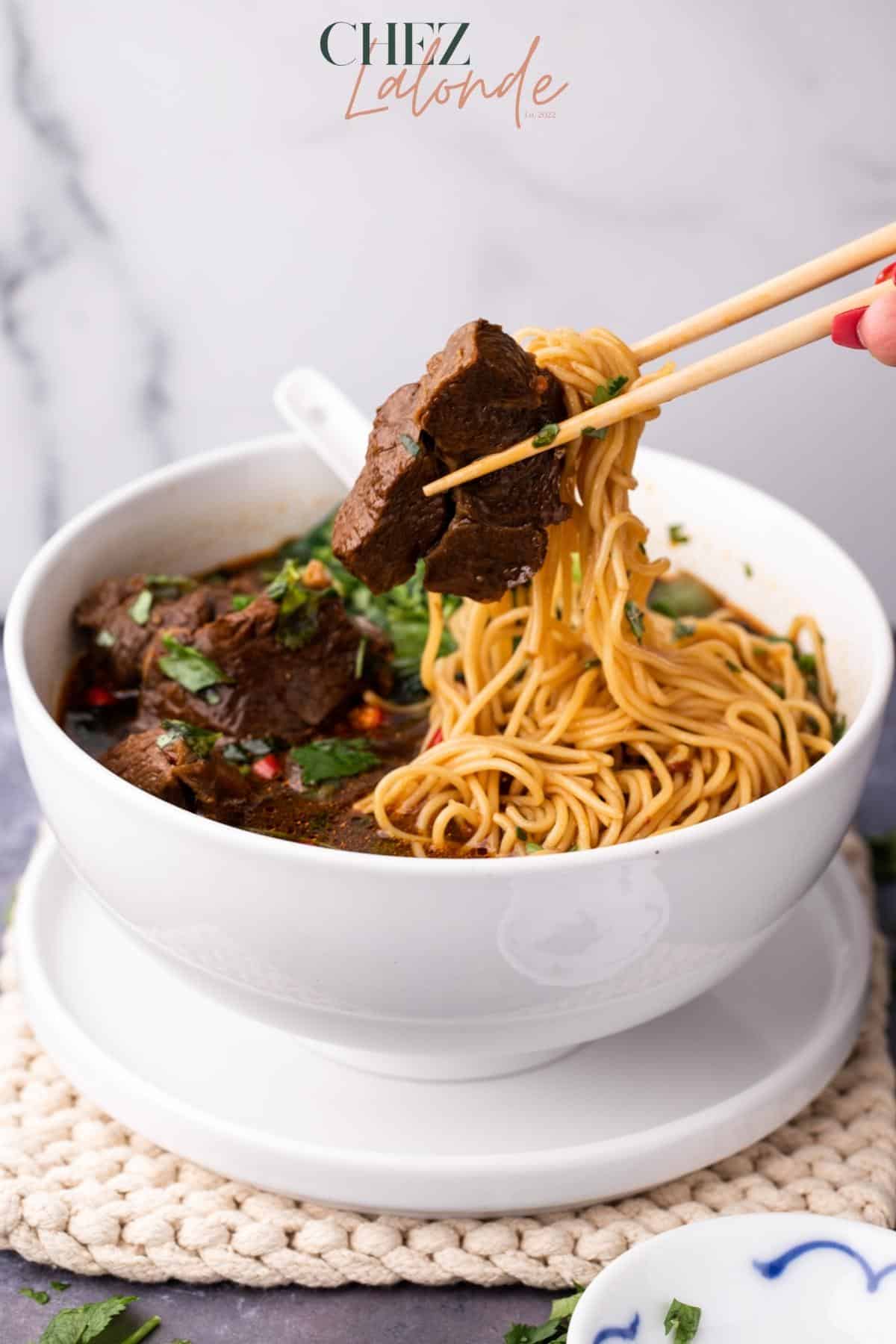

Key ingredients that make this noodle soup so distinctive:
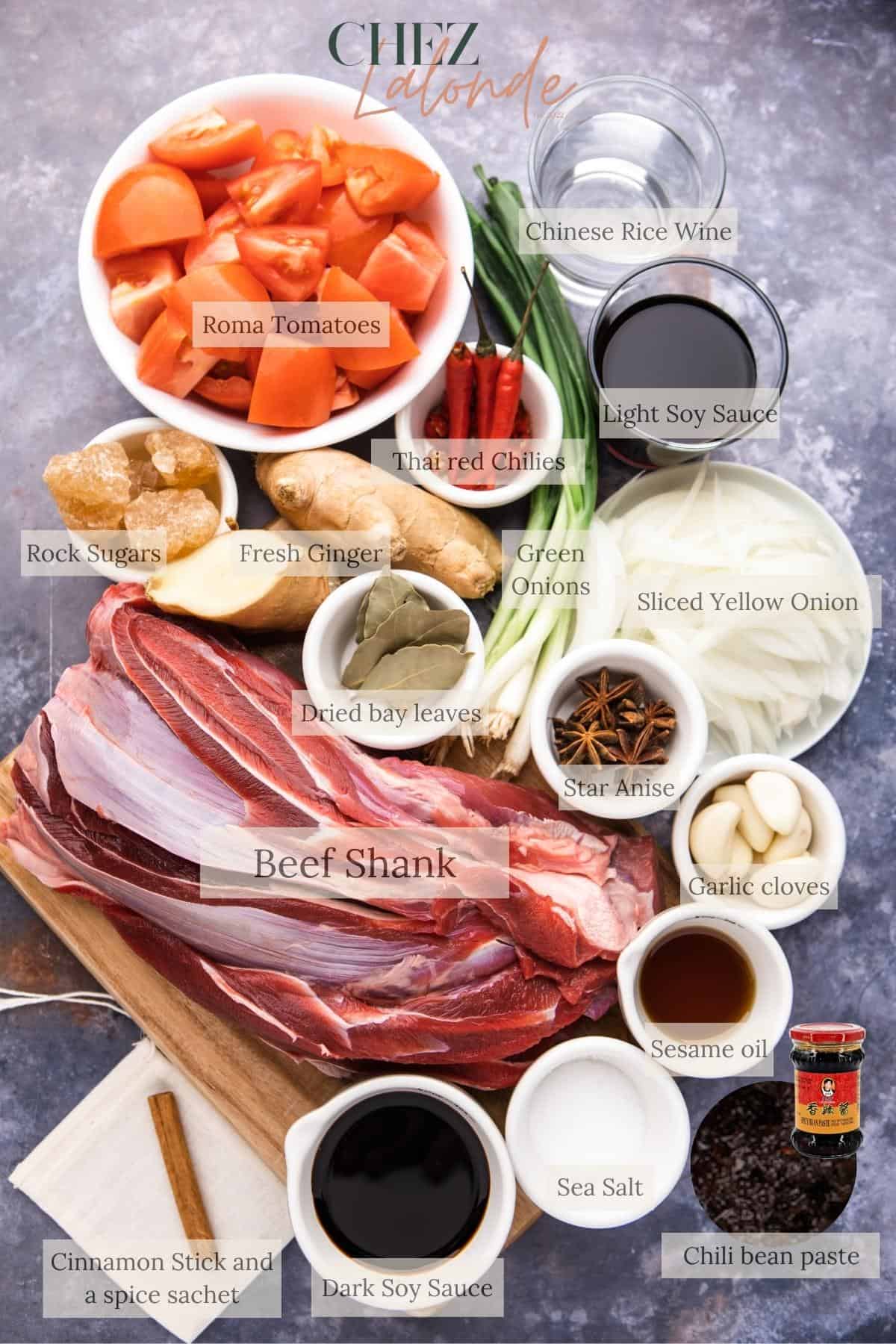
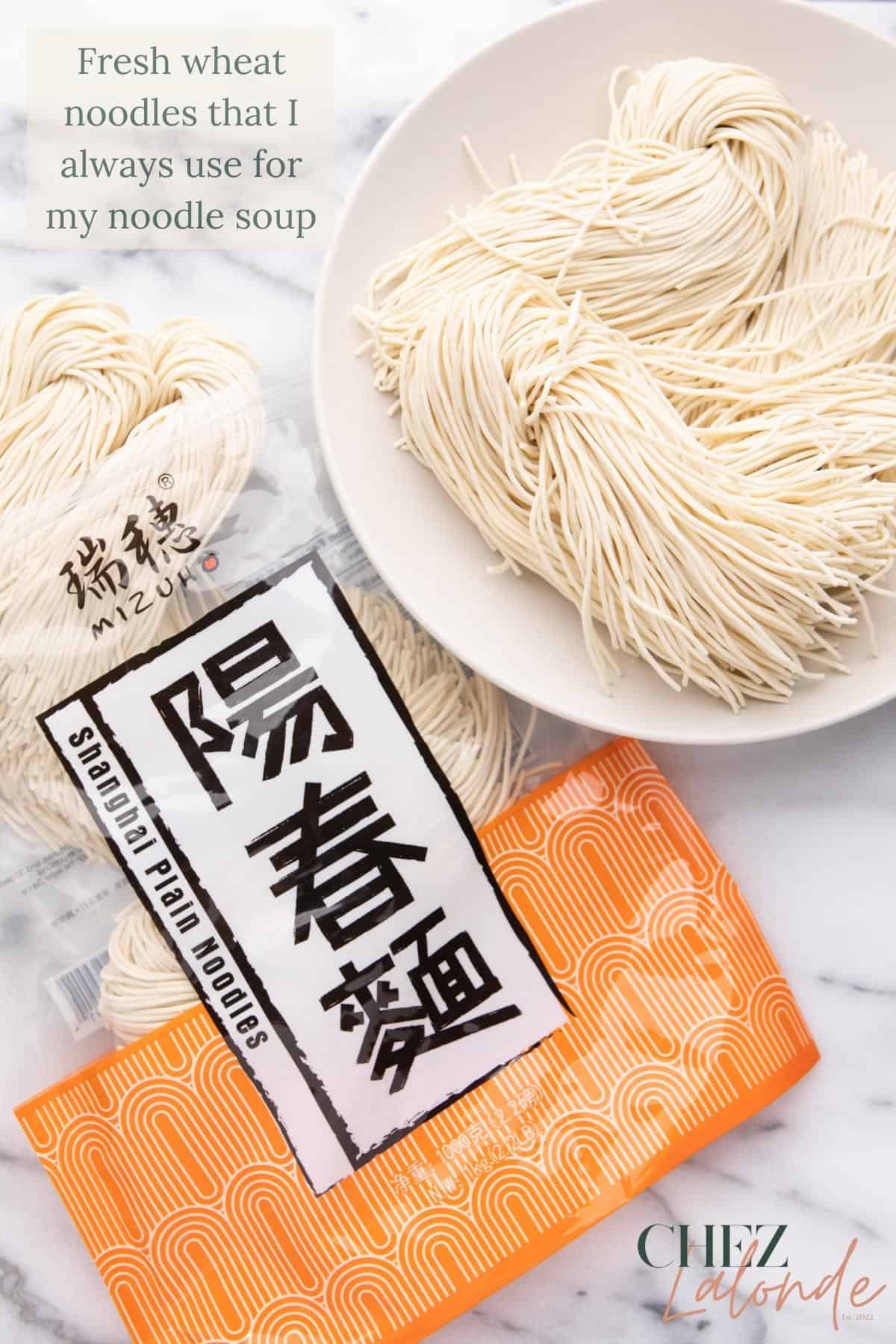
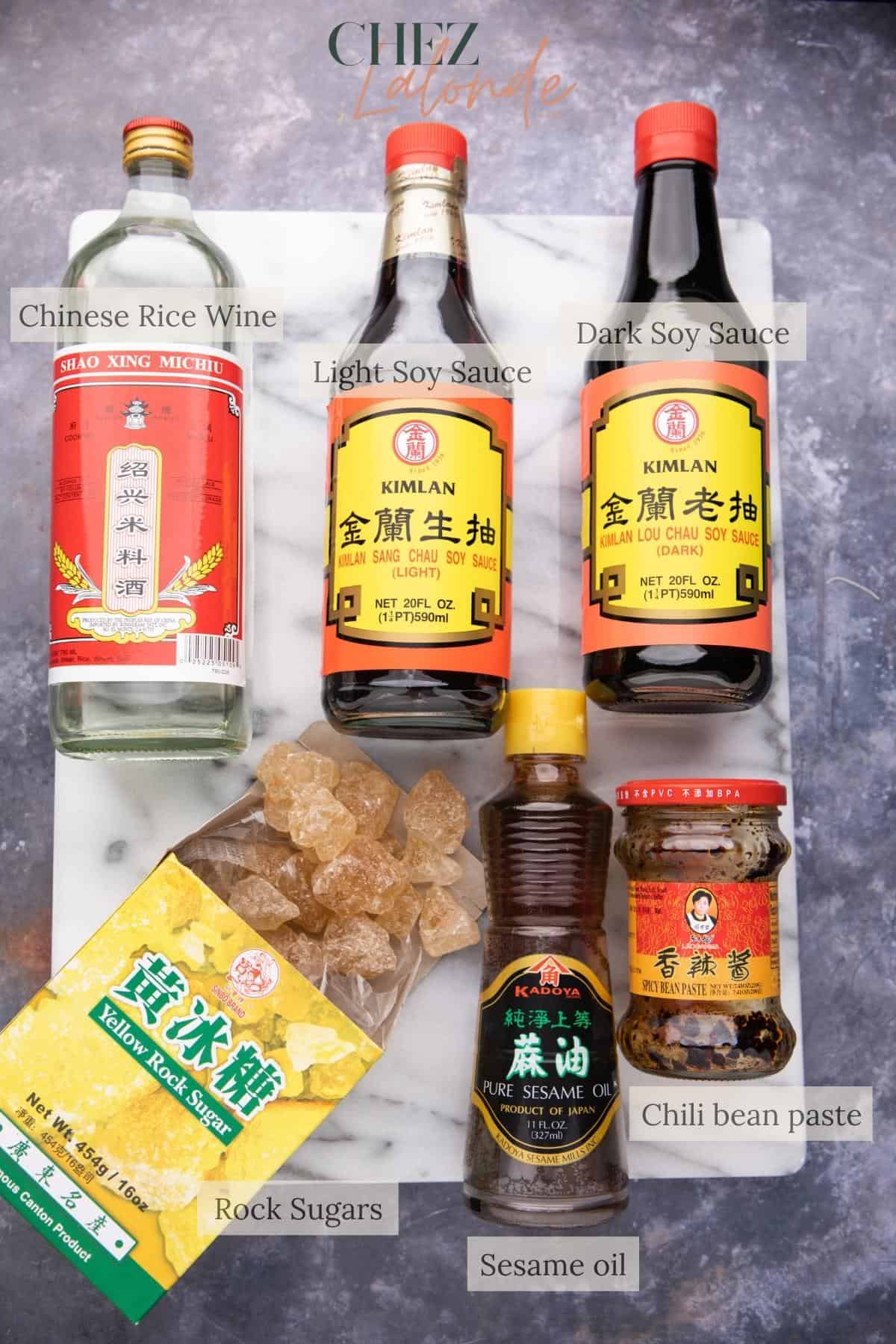
- Beef Shanks – It has excellent texture and contains collagen and connective tissues. Inexpensive. When the meat breaks down during the slow-cooking process, it helps create a rich and beefy flavorful soup.
- White fresh or dried wheat noodles – The chewy texture and slightly nutty flavor complement the savory and spicy broth.
- Baby Bok Choy (or other vegetables of your choice) – this vegetable style has a mildly sweet flavor and crunchy texture. It helps add an extra layer of texture to this dish.
- Roma Tomatoes – Tomato and beef are the best partner in any cuisine. It helps balance out the soup’s spiciness, and the tangy flavor also adds a nice contrast to the beefy broth.
- Fresh ginger and Green onions – This recipe needs many of these ingredients. We need them in the blanching process of the beef shanks to help draw out the impurities and gamey flavor of the meat. This traditional Chinese cooking technique ensures the broth’s delicious and clean flavor. These two ingredients are also the main base for the broth.
- Yellow onions – To enhance the flavor and complexity of the dish.
- Garlic cloves- To help add a strong, pungent flavor to balance out the heat from the spices.
- Thai red chilies – We use them to enhance the broth’s spiciness and garnish the dish. You can omit this ingredient and make your broth less spicy.
- Chopped Cilantro – This garnish makes the soup more visually appealing. This ingredient also adds a fresh and herbal flavor to complement the other flavors in the soup.
- Rock Sugar – This is the Chinese secret to tenderizing tough-cut meat. When it dissolves in the broth, it will help break down the tough fibers of the meat—resulting in more tender and juicy meat.
- Light Soy Sauce – Helps intensify the flavor and enhance its umami flavor.
- Dark Soy Sauce – This aged soy sauce adds a darker hue and more depth to the broth.
- Chinese rice wine (Shaoxing Wine) – This is an essential ingredient to this dish. It helps tenderize the beef and create a more flavorful dish.
- Sesame oil – its nutty flavor helps to balance the soup’s spiciness and adds a subtle sweetness to the broth.
- Chili bean paste (Dou Ban Jiang) (辣豆瓣醬) – Chili bean paste or Dou Ban Jiang are essential ingredients that can be purchased in your local Asian supermarkets. It is a red hue, sweet, and mildly spicy. It is the soul of the dish. It helps enhance the umami flavor and brings out other flavors in the soup.
- Sea salt – To add during the blanching process with the beef shanks.
- Water – To blanch the beef shanks and make the broth.
- Homemade Spice packet – Star Anise, Cinnamon sticks, and dried bay leaves – This homemade spice packet is an essential ingredient to this dish. Star anise is a star-shaped seed pod with a sweet and licorice-like flavor. Cinnamon sticks provide a warm, sweet, and spicy flavor, while bay leaves add an earthy and woodsy aroma. This combo of flavors creates a delicious, fragrant, spicy beef noodle soup.
- Cheesecloth Bag or a stainless steel mash seasoning ball. – To create a spice packet to contain all of the spices.

Don’t know how to use these Asian sauces & condiments?
Check Out My Chinese Pantry Essential Guide To Learn More

What vessel should you use for cooking your soup?
I cooked my soup on low simmering heat for 3 hours using my 5Qt Le Creuset Dutch oven. I love to use my Dutch oven when I have to simmer my food for an extended period. Cast iron is an excellent conductor of heat, and the heavy lid helps trap moisture so the meat cooks evenly. This results in tender, juicy meat, and the broth are flavorful. However, you can also cook this dish using a crock pot or Instant Pot. Here is a fantastic Instant Pot recipe from Woks Of Life.
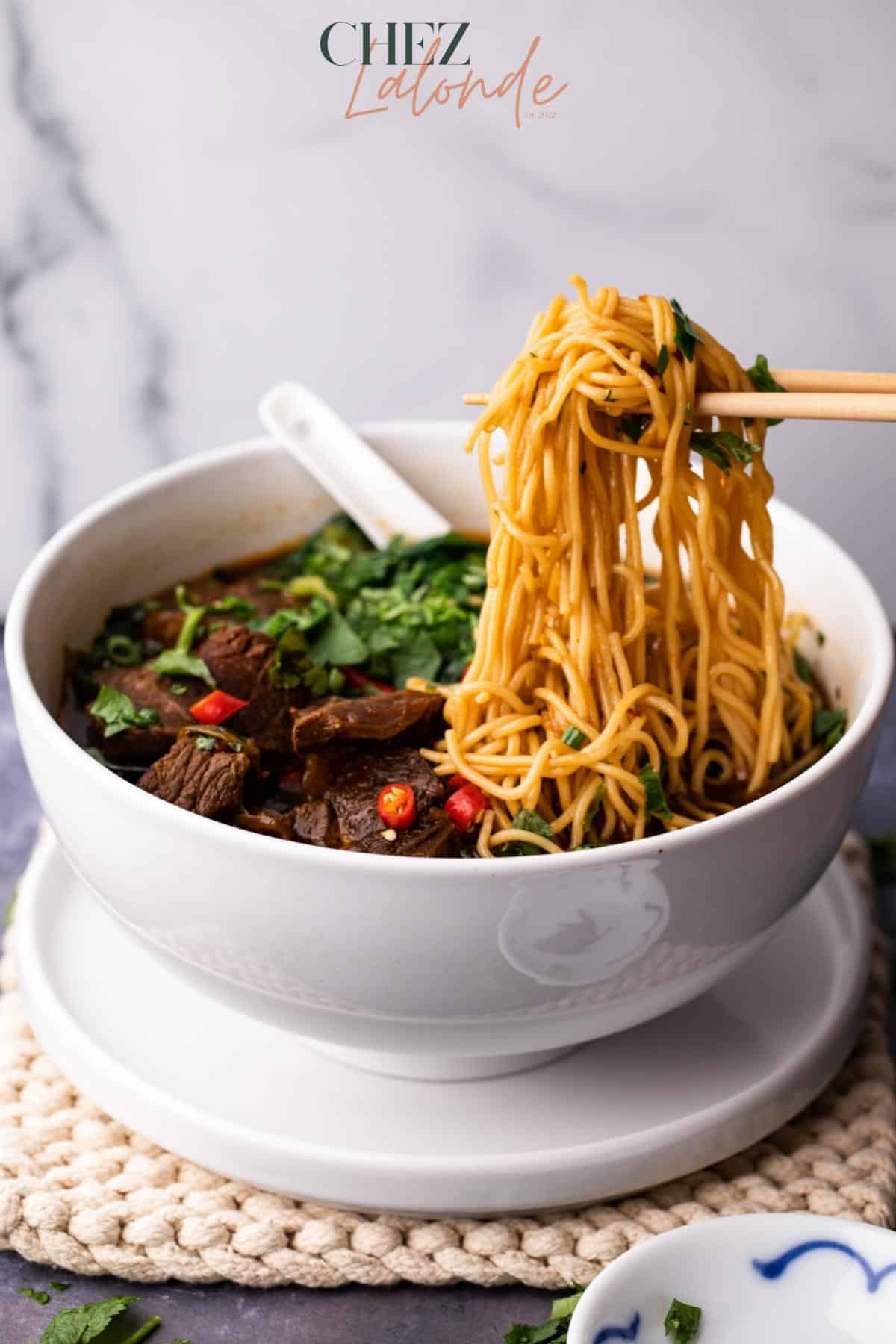
Different variations and substitutions of the dish
Here is a step-by-step guide on how to make this noodle soup:
Step 1 – Rinse the beef shank with water, and pat dry with kitchen paper towels. Use a sharp knife to trim and discard any impurities and excess fat. Keep the whole beef shank intact, and do not cut it into small pieces yet.
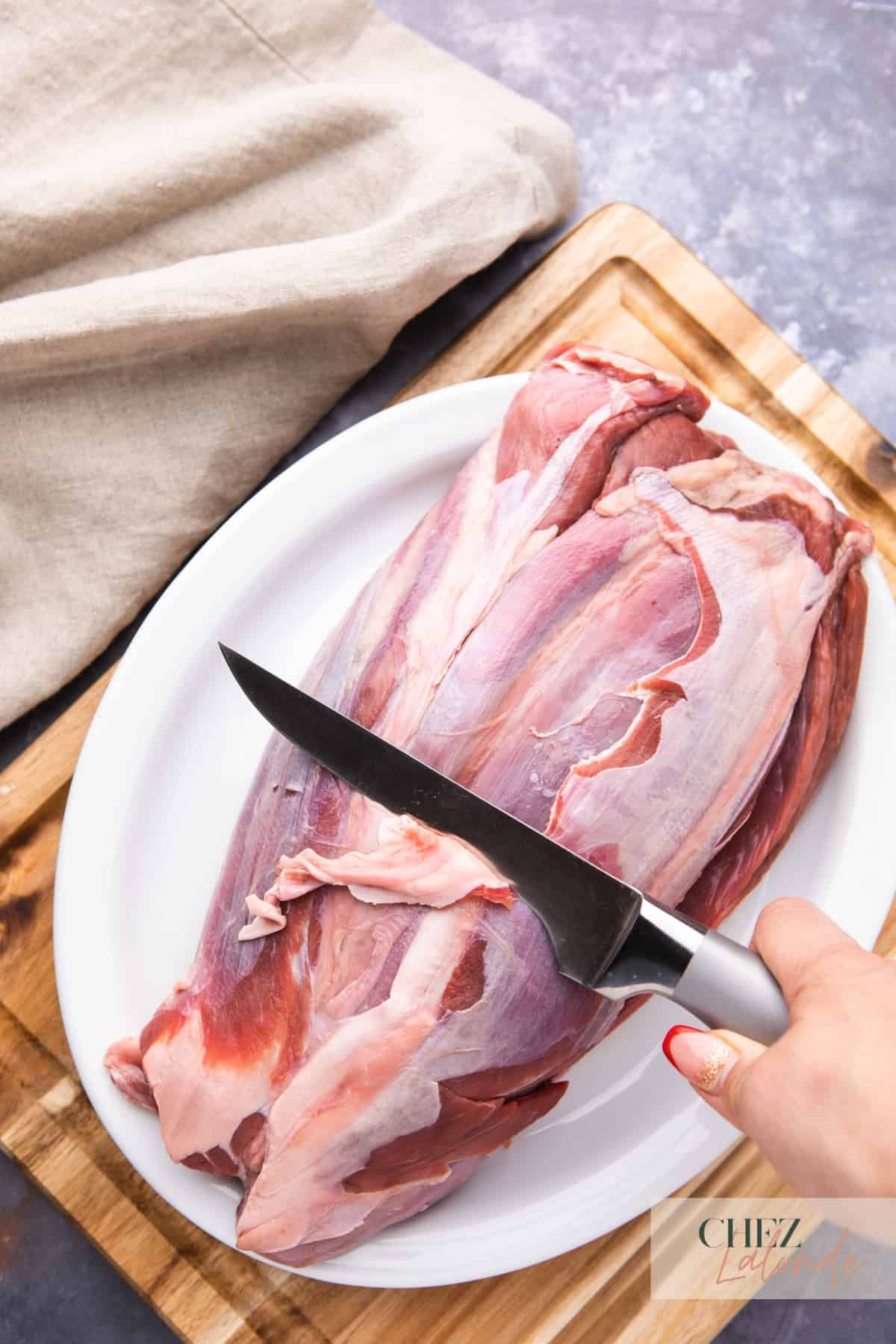
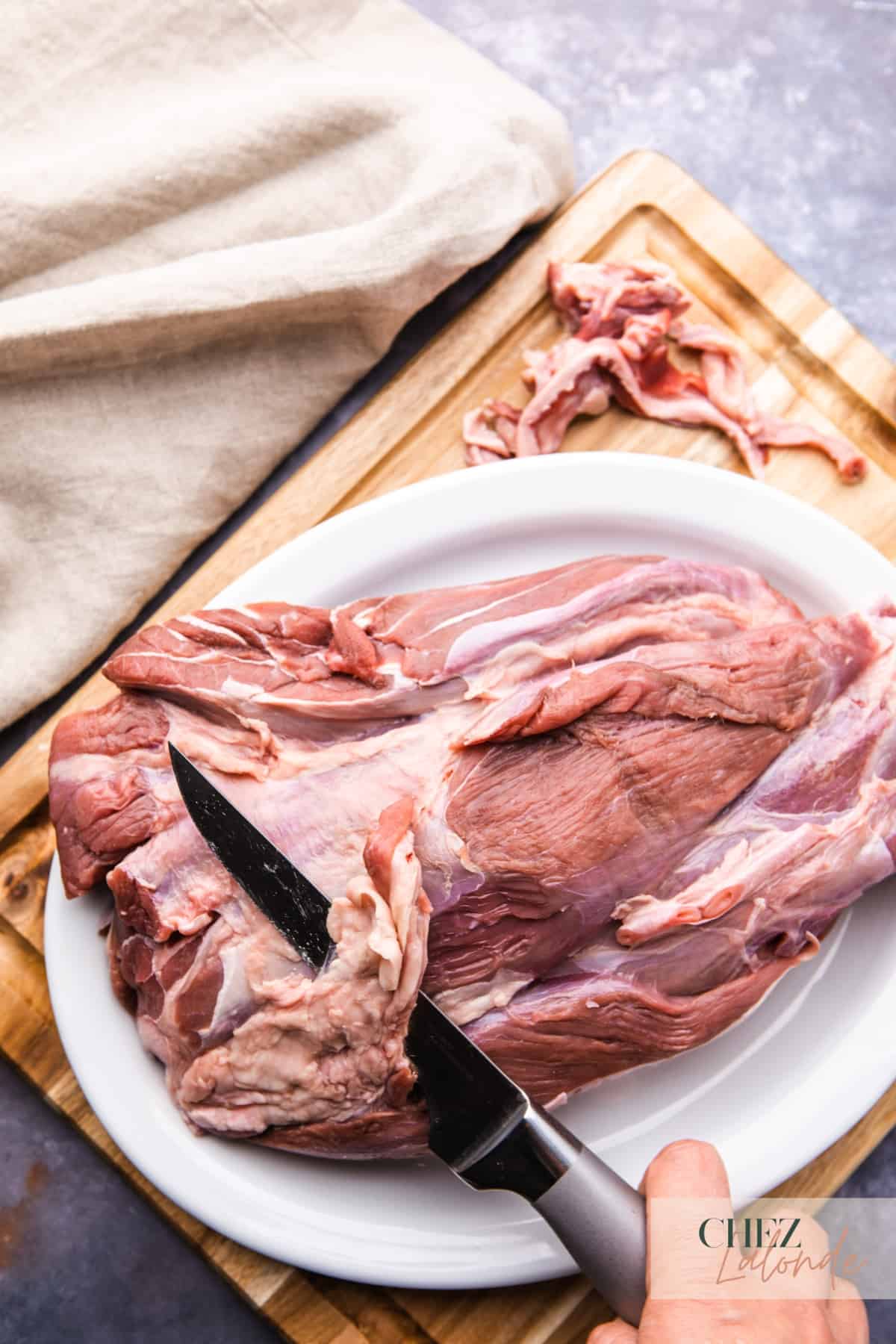
Step 2 -Clean 12 stalks of green onions thoroughly. Discard the root end and any wilted, browned, or discolored tops or ends. Next, rinse the green onions to remove dirt or debris under cold water. Next, cut them lengthwise to about 3 inches long. Don’t forget to reserve and chop some of the top parts of the green onions into small pieces as garnish.
Step 3 – Peel, cut, and smash 12 slices of fresh ginger with a meat tenderizer or with the back of your knife to release its aroma.
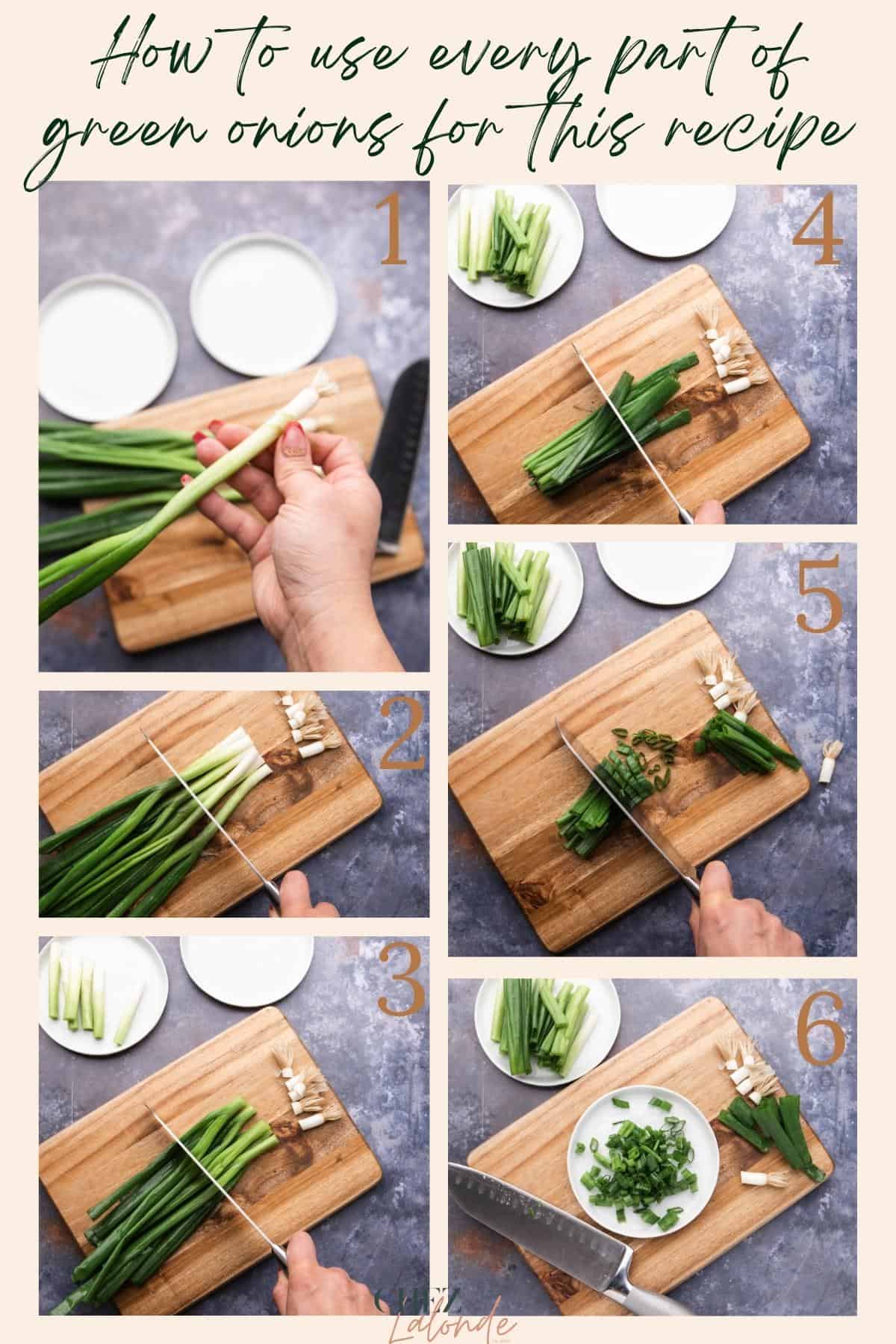

Separate these two ingredients into two even portions. Half the portion will go in a pot to blanch the beef shank. The other half will be used for cooking the broth.
Step 4 – Fill a large pot with cold water. Ensure the water level is enough to cover the beef shank. Add one tablespoon of sea salt, half of the cut scallions stalks, and smashed ginger into the pot. Cover and bring the liquid to a boil over high heat. (Picture #1)
Step 5 – Add the beef shank once the water is boiled and cook it with ginger and green onions broth for about 8 minutes. After this process, remove the meat from the pot and discard the broth because it contains impurities from the beef. Cut the meat into thick pieces about half an inch thick. Set them aside. (Picture #2)
Note: The beef shank is not fully cooked at this step. Do not worry about if the meat is still raw in the middle. This blanching process helps reduce the gamey flavor of the meat as well as to ensure the blood will not ruin the broth and affect the taste)
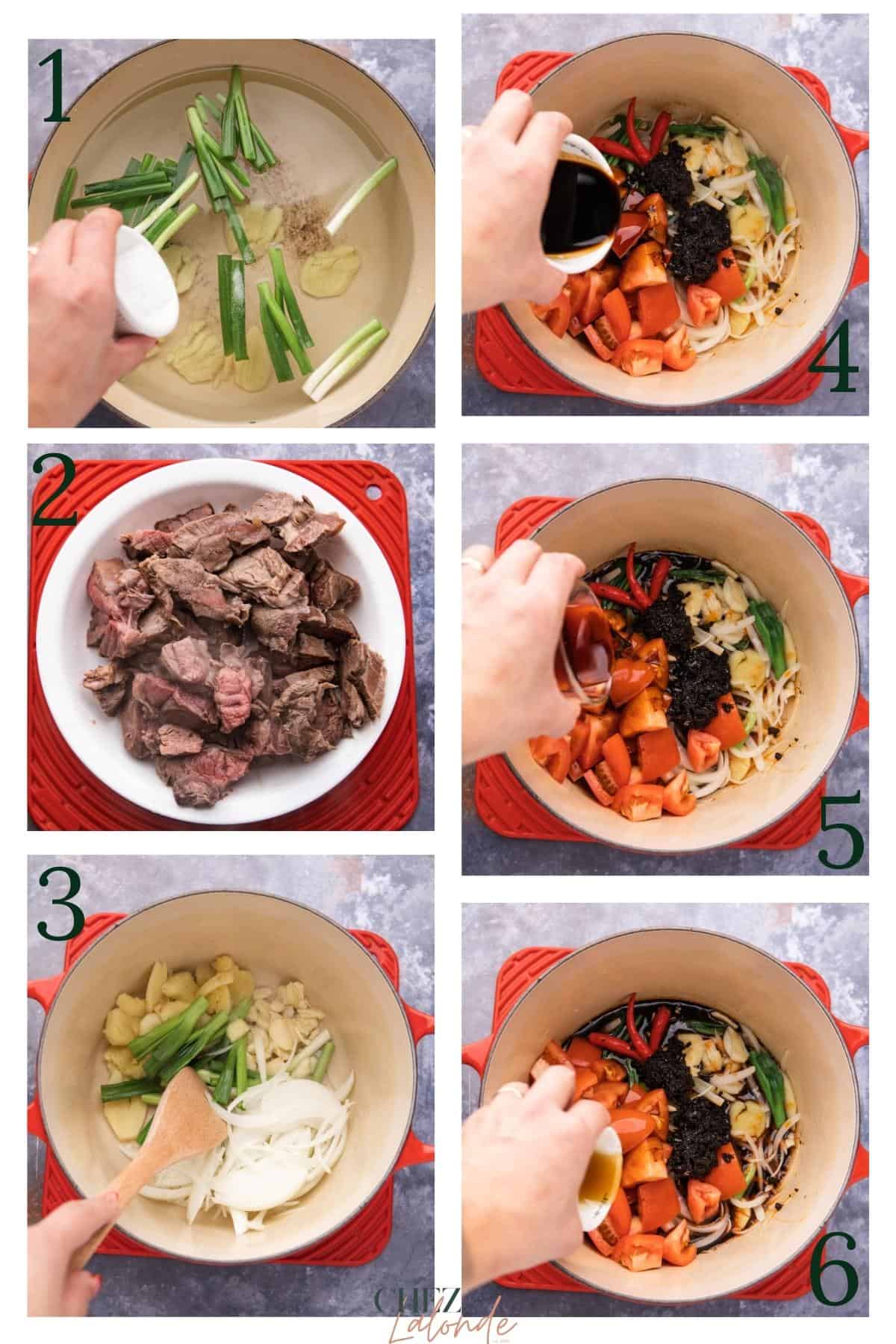
Step 6 – Heat your Dutch oven with two tablespoons of vegetable oil on high heat. Add the second portion of cut green onions, smashed ginger, roughly chopped garlic, and sliced yellow onion into the pot. Cook them for 3 to 4 minutes or until fragrant. (Picture# 3)
Step 7 – Add your Roma tomato wedges, three Thai chili, and four tablespoons of spicy bean paste. Cook them for another 4 to 5 minutes until the tomatoes are softened.
Step 8 – Time to add some sauces to create the broth base. Add one-third of a cup of dark soy sauce, half a cup of light soy sauce, half a cup of Chinese cooking wine, two tablespoons of sesame oil, and some rock sugars. Cover and bring the liquid to a boil on medium-high heat for another 6 to 8 minutes. (Pictures # 4 to 9)
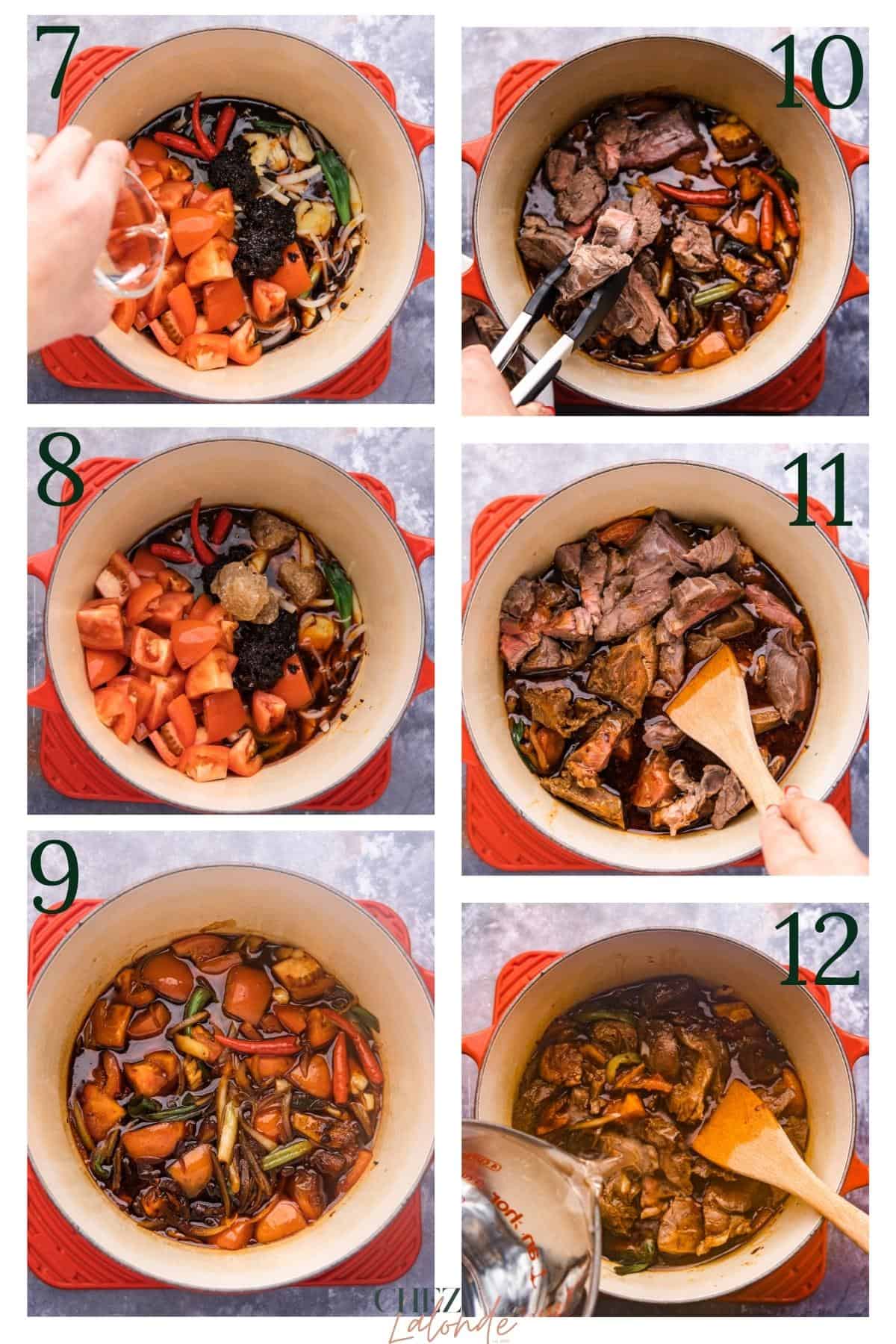
Step 9 – Stir in cooked sliced beef shanks, mix well, and add 6 cups of water to the pot. Please ensure all of the ingredients are immersed in the liquid. If not, add extra water to the pot one cup at a time. (Pictures # 10 to 12)
Step 10 – Get a 4×3 inches cheesecloth bag to create your spice sachet; insert your cinnamon stick, bay leaves, and star anises in the bag, tie it up, and ensure they will not float out from the bag during the cooking process. Add it to the pot and mix the ingredients with a wooden spoon. Cover the lid and boil the broth on high heat for 30 minutes. (Pictures # 13 to 14)
Step 11 – After 30 minutes, stir the ingredients to ensure everything cooks evenly. Cover the lid, lower the temperature, and let the broth simmer on low heat for another two hours. You can check on the broth every hour to ensure the meat is submerged and everything cooks evenly. Let it simmer for two and a half to three hours for the best result. (Pictures # 15 to 16)
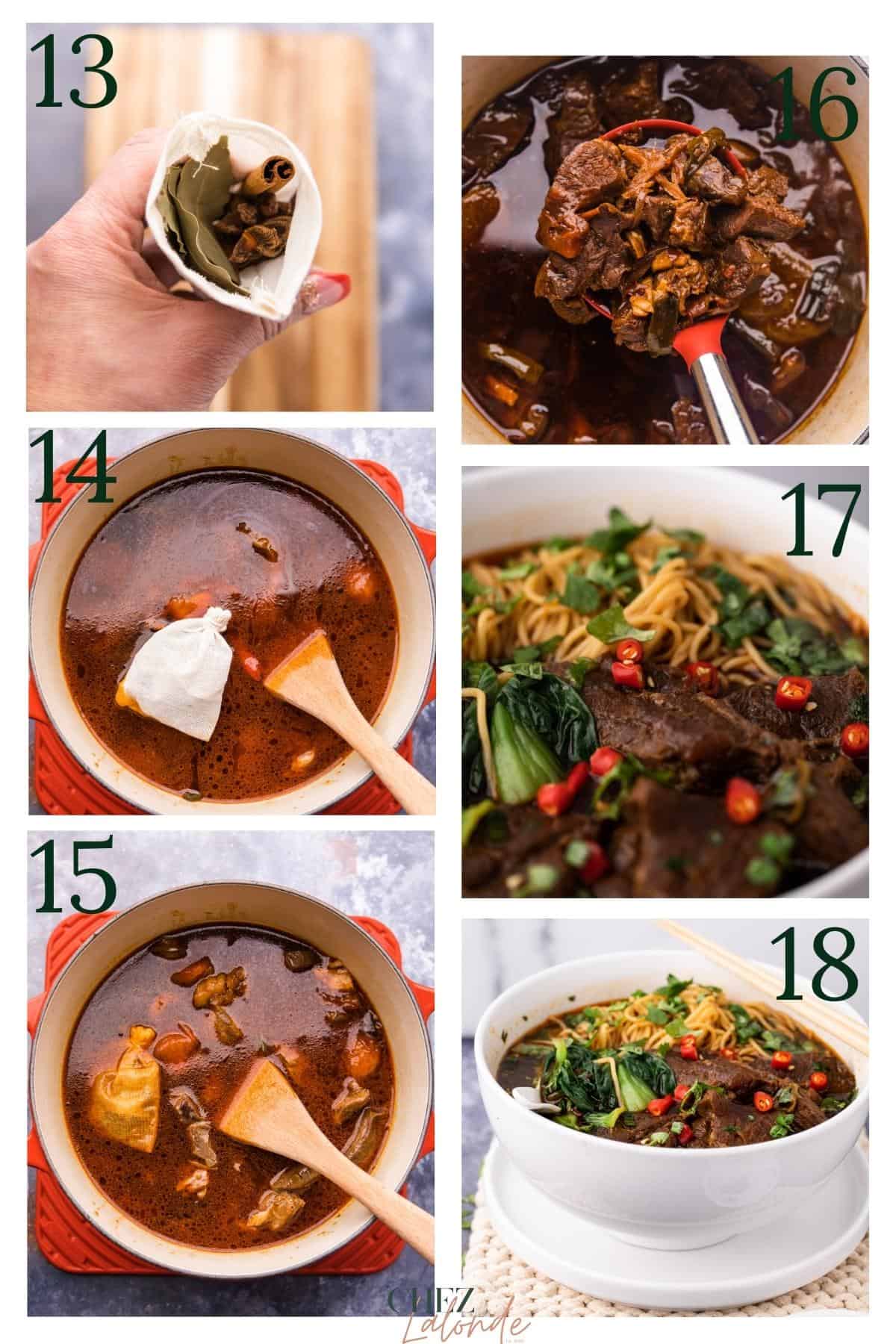
Step 12 – Remove and discard the spice packet after simmering the beef broth. Heat 2 small pots of water on medium-high heat. One pot is for blanching the bok choy (Or other vegetables of your choice), and the other is for boiling the noodles. Please note that you do not need to season the water with salt or other seasonings.
Step 13 – Bring the water to a boil. Add your pre-washed Bok Choy to the pot and blanch it for 3 to 5 mins or until tender. Take them out once they are cooked and set aside. Do not discard the vegetable water. In the other pot, cook the noodles according to the package’s instructions. If you are using fresh wheat noodles as I do. You only need to cook it at a maximum of 2 minutes per serving.
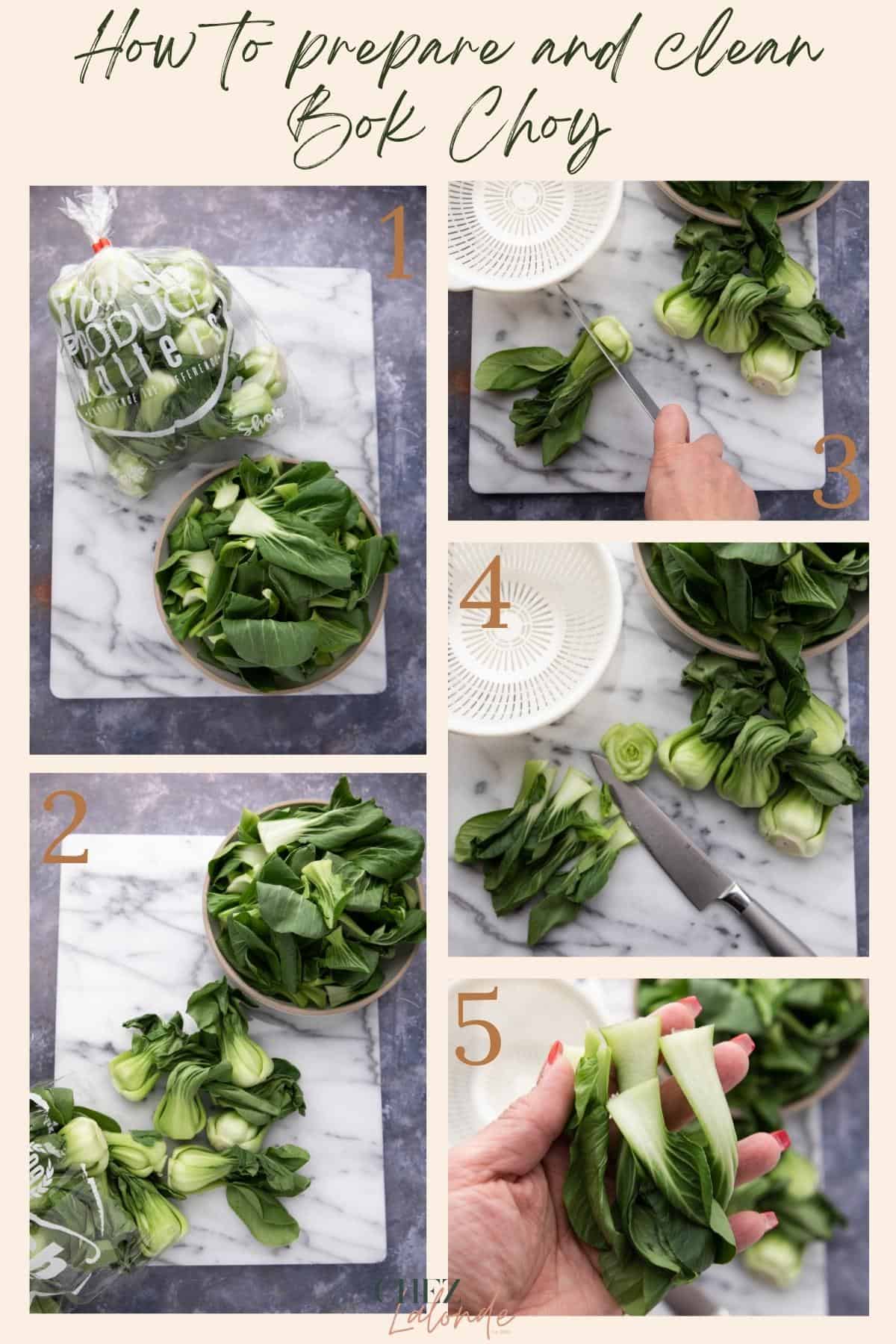
Step 14 – Let’s get ready to assemble the dish. Put noodles, a generous amount of beef shanks (Don’t be shy… get as many as you want), and bok choy in a big bowl. Pour a ladle of vegetable water into the bowl, and then ladle one to two ladles of beef broth. Garnish some chopped scallions, Thai Chili, and cilantro to your liking. Enjoy! (Picture # 17 to 18)
Pro Tips
- Refrain from overcooking the noodles. Follow the instructions on the package. If you are cooking fresh wheat noodles as I do here. All you need is to boil the noodles for a maximum of 2 minutes.
- Always blanch your noodles and your choice of vegetable in a separate pot. I would even have two pots of boiling water ready, one for my Bok Choy and another to cook just my noodles. I do that because I don’t want these ingredients to dilute my broth and make my broth cloudy.
- The beef broth can be a bit salty at the end. So I like to pour a ladle of vegetable broth (Right after you blanch your veggies) and then pour one to two ladles of beef broth in my bowl so my noodle soup won’t be too salty. I learned this trick from many noodle shops in Asia. I saw that’s how they serve their noodles.
- When braising in Chinese style, using a cheesecloth bag or a seasoning ball to create a spice sachet to contain all the spices in one place is smart. I never used it due to my laziness. Still, after so many times my family accidentally chewed on a star anise pod or cinnamon stick, which left a weird flavor in their mouth, I decided to go ahead and start using it to contain my spices. It makes it easier not to have to fish every single of these ingredients out in the soup before I serve it.
- Avoid over-stirring the broth or opening the lid too often during braising or simmering to check on the process. You do not need to check every ten or fifteen minutes. Let the dutch oven does its job. Retaining the pot’s heat will result in more juicy and tender meat.
What will pair well with your dish?
For more Asian-style recipes, check them out here:
Quick Notes
How to store your dish
- This dish is even better the next day. Give the beef shanks time to soak up and marinate in this spicy and delicious broth. Let the soup pot cool down, put it in the fridge, and enjoy it the next day or two.
- I will never pre-made the noodles and vegetables ahead of time. Make it when you are ready to eat. They are best to consume when fresh. They do not taste good overnight.
- Store your noodles with the broth in a different container if you have leftovers. Noodles expand when they soak in liquid, making them gross the next day. Please remember.
I am sure you won’t even have any leftovers… it is this good!

FAQs about this noodle soup
Well, my fellow foodies, are you ready to channel your inner chef and try to create this spicy Taiwanese beef noodle soup at home? Whether you’re a seasoned pro or a beginner cook, this recipe is easy to follow and can be customized to your liking.
Get ready to impress your dinner guests with this show-stopping noodle soup. Trust me; your efforts will be rewarded with slurps and smiles all around the table.

So, let’s get cooking and explore the depths of Taiwanese cuisine together! And don’t forget to follow my blog and social media accounts for more delicious recipes and foodie inspiration.
Happy slurping!
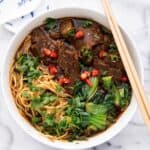
Taiwanese Spicy Beef Noodle Soup: A Step-by-step guide
- Total Time: 4 hours
- Yield: 6 to 8 bowls
Description
Taiwanese spicy beef noodle soup is a traditional dish from Taiwan widely enjoyed in Taiwan and worldwide. It is a hearty and flavorful soup with slow-cooked beef, spices, and various seasonings served over noodles. The broth is typically spicy, with a savory and slightly sour taste, and the tender beef provides a delicious contrast to the spicy broth. This dish is known for its unique flavor and texture, and it is considered a staple in Taiwanese cuisine, often served as comfort food or as a meal in itself.
Ingredients
3 lbs of beef shanks
12 Stalks of green onions (6 stalks for blanching, 6 stalks for the soup)
12 Slices of fresh ginger root (6 slices for blanching and 6 slices for the soup)
1 Tablespoon of sea salt (For blanching the beef shank only)
2 Tablespoons of vegetable oil
4 Roma Tomatoes – Cut into small wedges
1 Medium yellow onion – Sliced
8 Cloves of garlic – Roughly chopped
6 Thai red chilies – (3 whole chilies for soup and chop the other three chilies as garnish)
1/2 Cup Fresh cilantro as garnish – Chopped
4 Pieces of rock sugars
1/2 Cup of Light Soy Sauce
1/3 Cup of Dark Soy Sauce
1/2 Cup of Chinese rice wine (Shaoxing Wine)
2 Tablespoons of Sesame oil
4 Tablespoons of Chili bean paste
6 Cups of water (You can add more as needed)
6 Star anise pods
1 Cinnamon stick (Cut it to 3 inches long)
5 Dried Bay leaves
Instructions
-
Rinse the beef shank with water, and pat dry with kitchen paper towels. Use a sharp knife to trim and discard any impurities and excess fat. Keep the whole beef shank intact, and do not cut it into small pieces yet.
-
Clean 12 stalks of green onions thoroughly. Discard the root end and any wilted, browned, or discolored tops or ends. Next, rinse the green onions to remove dirt or debris under cold water. Next, cut them lengthwise to about 3 inches long. Don’t forget to reserve and chop some of the top parts of the green onions into small pieces as garnish.
-
Peel, cut, and smash 12 slices of fresh ginger with a meat tenderizer or with the back of your knife to release its aroma.
-
Fill a large pot with cold water. Ensure the water level is enough to cover the beef shank. Add one tablespoon of sea salt, half of the cut scallions stalks, and smashed ginger into the pot. Cover and bring the liquid to a boil over high heat.
- Add the beef shank once the water is boiled and cook it with ginger and green onions broth for about 8 minutes. After this process, remove the meat from the pot and discard the broth because it contains impurities from the beef. Cut the meat into thick pieces about half an inch thick. Set them aside.
-
Heat your dutch oven with two tablespoons of vegetable oil on high heat. Add the second portion of cut green onions, smashed ginger, roughly chopped garlic, and sliced yellow onion into the pot. Cook them for 3 to 4 minutes or until fragrant.
-
Add your Roma tomato wedges, three Thai chili, and four tablespoons of spicy bean paste. Cook them for another 4 to 5 minutes until the tomatoes are softened.
-
Time to add some sauces to create the broth base. Add one-third of a cup of dark soy sauce, half a cup of light soy sauce, half a cup of Chinese cooking wine, two tablespoons of sesame oil, and some rock sugars. Cover and bring the liquid to a boil on medium-high heat for another 6 to 8 minutes.
-
Stir in cooked sliced beef shanks, mix well, and add 6 cups of water to the pot. Please ensure all of the ingredients are immersed in the liquid. If not, add extra water to the pot one cup at a time.
-
Get a 4×3 inches cheesecloth bag to create your spice sachet; insert your cinnamon stick, bay leaves, and star anises in the bag, tie it up, and ensure they will not float out from the bag during the cooking process. Add it to the pot and mix the ingredients with a wooden spoon. Cover the lid and boil the broth on high heat for 30 minutes.
-
After 30 minutes, stir the ingredients to ensure everything cooks evenly. Cover the lid, lower the temperature, and let the broth simmer on low heat for another two hours. You can check on the broth every hour to ensure the meat is submerged and everything cooks evenly. Let it simmer for 2 1/2 to 3 hours for the best result.
-
Remove and discard the spice packet after you finish simmering the beef broth. Heat 2 small pots of water on medium-high heat. One pot is for blanching the bok choy (Or other vegetables of your choice), and the other is for boiling the noodles. Please note that you do not need to season the water with salt or other seasonings.
-
Bring the water to a boil. Add your pre-washed Bok Choy to the pot and blanch it for 3 to 5 mins or until tender. Take them out once they are cooked and set aside. Do not discard the vegetable water. In the other pot, cook the noodles according to the package’s instructions. If you are using fresh wheat noodles as I do. You only need to cook it at a maximum of 2 minutes per serving.
-
Let’s get ready to assemble the dish. Put noodles, a generous amount of beef shanks, and bok choy in a big bowl. Pour a ladle of vegetable water into the bowl, and then ladle one to two ladles of beef broth. Garnish some chopped green onions, Thai red chilies, and cilantro to your liking.
Notes
- Separate the total amount of green onions and ginger into two even portions. Half the portion will go in a pot to blanch the beef shank. The other half will be used for cooking the broth.
- Do not worry when the beef shank is still raw in the middle after the blanching process. The purpose of this process is to help reduce the gamey flavor of the meat as well as ensure the blood will not ruin the broth and affect the taste.
- Prep Time: 1 hour
- Cook Time: 3 hours
- Category: Asian Cuisine
- Method: Slow-cooked
- Cuisine: Taiwanese

